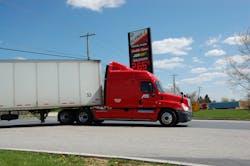Five fuel-saving tips for truck drivers
By Ann Neal
A freelance writer who covers technology and business trends, Ann Neal (twitter: @Ann_G_Neal) frequently pens stories on behalf of Lintech, a high technology corporation dealing with kinds of Security products. In this guest column, Neal provides tips truck drivers can use to help save on fuel.
Achieving the best possible fuel economy is no longer a fad; it is a lifestyle change being focused particularly on commercial truck drivers.
In the U.S., the trucking industry burns some 38 billion gallons of diesel annually and a host of initiatives are underway to try and reduce that in a variety of ways – via regulatory efforts such as the Phase 2 greenhouse gas (GHG) rules to the introduction of new technologies such as platooning.
“Though heavy long-haul trucks only make up 4% of the U.S. fleet, they account for 13% of daily fuel consumption by the transportation sector,” explained Robbie Diamond, president and CEO of the Securing America’s Future Energy (SAFE) advocacy group, during a recent press conference in Washington D.C. “That’s three million barrels of oil per day.”
Yet there are things truck drivers can do right now to improve the fuel economy of their equipment that don’t require new technology or government intervention. Here are five of them:
- Drive more responsibly
When it comes to improving your fuel consumption, slowing down is the easiest thing to do. It becomes harder for your engine as you pick up the speed, giving it additional stress. Besides, speeding decreases the fuel economy of your truck. Studies indicate that every 5 mph driven over 65 mph represents a 7% decrease in fuel economy. So driving within the speed limit will not only help you avoid the dangers of speeding but also save fuel.
Also, if the weather permits, switch off the air conditioner from time to time and let in the breeze. In fact, use air conditioners only when it’s too hot. There are many others ways you can drive your truck more responsible, including:
- Avoiding unnecessary idling as it can consume a gallon of fuel every hour.
- Switch-off the engine when not in use.
- Whenever possible, use cruise control during highway driving.
- Improve Your Truck’s Aerodynamics
Heavy duty vehicles burn a lot of fuel as they push up against air resistance while reducing aerodynamic “drag.” It is therefore essential to improve your truck’s aerodynamics to gain fuel efficiency. Studies found that almost 50% of a truck's fuel is consumed for overcoming aerodynamic drag while traveling at highway speeds. The good news is there are certain things you can do to improve your trucks’ aerodynamic profile.
For example, if your trailer is taller than your tractor, use a roof-mounted cab deflector, deep angled bumper, or sun visor to deflect the air from your windscreen onto the top of the trailer.
To avoid the turbulence underneath the trailer, use side fairings that channel air down the side of the trailer.
- Be Conscious of the Traffic Conditions
Every time you need to re-start after coming to a stop in traffic, your truck needs first gear as well as a huge amount of fuel to start. It is almost same with second gear. Monitor traffic signs and conditions so that you can correctly anticipate when to slow down, for it more fuel efficient to keep your truck moving instead of starting from a complete stop at the light.
Better still, that will help you reduce the number of gear changes needed, especially if you are still using a manual shifter. Avoiding heavy braking will also help cut fuel consumption.
A good practice for any commercial truck driver is to check for any hazards in advance. These days, a lot of intelligent navigation tools are available that help you avoid traffic congestion and take the most efficient route from one job to another for rush hour will mean a lot of fuel will be wasted as you sit in traffic.
- Engine Oil & Fuel
Using the manufacturer recommended grade of motor oil can improve fuel mileage by 1% to 2%.
When it comes to diesel fuel, a few operational tips can make a difference:
- Fill up your truck early in the morning.
- Pump fuel at a low setting if you can as this will minimize the vapors; more vapors means lesser fuel filling your tank.
- Fill up the tank before it is fully empty; the fuller your tank is, the better the mileage you will get.
- Consider using a premium grade of diesel fuel.
Also, avoid filling up at a station where the ground tanks have just been replenished. The dirt at the bottom of the ground tanks is likely to rise to the surface and get into your fuel tank, significantly cutting down your fuel efficiency.
- Conduct Regular Maintenance Checks
Regular maintenance of your truck can go a long way towards saving fuel. For instance, your truck will need more fuel to move if you have low tire pressure. Also check trailer and drive axle alignment, as it burns a lot of fuel to drag a tire sideways.
While it is important to change worn-out tires, don’t pull them prematurely. Compared to new tires, worn-out tires have less roll resistance, meaning they are more fuel efficient.
Additional maintenance and service tips include:
- Watch for leaking charge air coolers.
- Maintain regular service intervals
- Get an engine overhaul if you have an older engine.
- Replace old, worn-out fuel injectors.
In the end, improving your fuel mileage helps you save on your hard earned money as fuel typically adds up 39% of your truck’s operating expenses. Therefore, improving your fuel efficiency even by 2% to 3% can make a significant difference to your bottom line.
